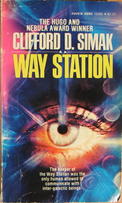I was a bit worried about this book. I've had a few disappointing experiences with old classics of science fiction, I'd not read a book by Clifford Simak before, and I wasn't sure that the premise was going to hold together. From the back cover, I picked up a vague expectation of some sort of space opera setting, with mankind trying to learn what it had to learn before some nasty alien race endangered it. The actual book was far different, and turned out to be an engrossing story of loyalty and alienation.
Enoch Wallace is the only person on Earth who interacts with the species inhabiting the rest of the galaxy. He is also a former Civil War soldier, still living apparently unaged one hundred years later, in an out-of-the-way backwater where people don't ask a lot of questions. Events conspire to start eroding his cover, and he has to come to terms with his loyalties, the future of Earth, the secrecy of the alien transit station he runs, and some hard decisions about what role he wants to play in the universe.
This may sound a bit dull if you're looking for a space opera, and indeed there is little action in this book. I hardly noticed. Simak's story-telling is engrossing and fascinating; he captures a sense of wonder about the alien civilizations of the galaxy tinged with a sense of alienation from humanity that is remarkably effective. Enoch's interactions with the aliens are diverse, challenging, and often baffling, whereas his interactions with humanity and his home environment are supportive but largely unchanging, letting Simak tell a very subtle story about the tension between growth and belonging. The alien interactions stretch Enoch's abilities and whet his appetite for deep pools of knowledge that humans have never tapped, and are in a sense "progress." His feelings for Earth, for his limited contacts with people, and for the mail carrier that he walks down to meet daily are in a sense the opposite: feelings of loyalty, grounding, and belonging, a delight in one's home, and a desire to see it change only within its own nature. They're "conservative," which is reinforced by his ritualized interactions with the rest of humanity. Yet, alien understanding, while more effective in some respects and more advanced, can be simply different rather than better for people, and conversely, there are many things about Earth that should change.
Another nicely subtle bit of characterization comes from making Enoch effectively immortal. His unnaturally long life alienates him from the rest of his species in a way that the reader can intuitively grasp. His friends and family are long-dead, the world has changed greatly from the world in which he grew up, and the surrounding society has developed different ideas and different goals. The reader has probably experienced some of this sort of alienation, so it can then serve as a bridge to understanding the greater alienation Enoch feels when dealing with alien cultures and advanced technology.
The book is not perfect. The resolution of the primary plotline is horribly pat and far too simple, although remedied somewhat by feeling like a bit of a sideline compared to the evolution of Enoch's feelings about his world. I see some point to the side plot with Enoch's "figments," but it still felt rather bolted on. There are also, as one might expect, some dated bits, from the typical charmingly bad extrapolations of technology to predictable Cold War worries. And, alas, I saw the plot device that was used to resolve the main plotline coming from some distance off (which means that it was fairly obvious, since I don't look for such things). I think fully enjoying this book requires a bit of indulgence, both for the era in which it was written and for Simak's desire to provide a resolution to a problem that's not possible to resolve in a 180-page story. (It's rather interesting how odd it feels to read a book in which secondary characters who are government agents are competent, efficient, intelligent, and willing to get out of the way when it's clear they should.)
That being said, I recommend this one highly. I don't expect this degree of subtlety and craft from a Hugo winner in the early 1960s, and it was a very pleasant surprise. Simak knows how to put the reader inside the head of a character and does so exceptionally well.
Reviewed: 2005-02-17
